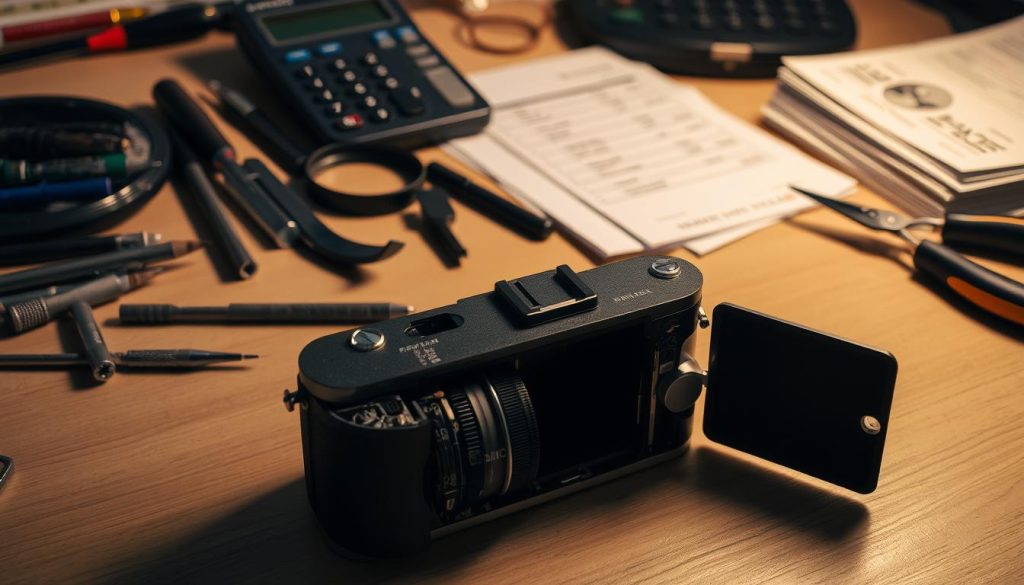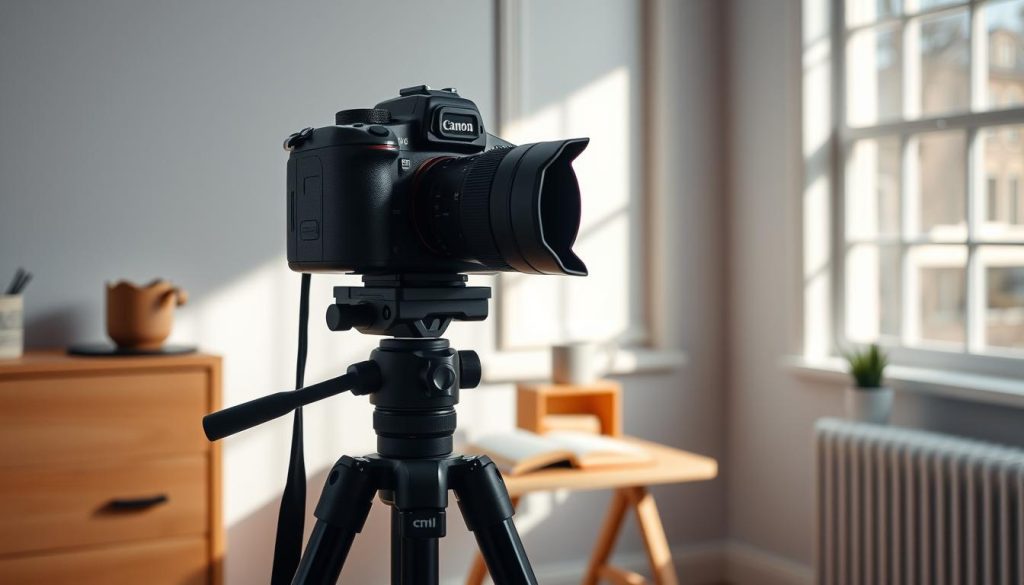The life of a camera varies a lot. It depends on the brand, model, and how often you use it. Most cameras last between 3 to 10 years.
Basic cameras usually last 3 to 5 years. But, better models can last 5 to 10 years or even longer. Knowing this helps people in Singapore choose the right camera.
It’s important to understand how long a camera will last. This way, you can make a smart choice when buying a new camera.
Key Takeaways
- The average camera lifespan can range from 3 to 10 years.
- Standard cameras may last 3 to 5 years with average use.
- Higher-quality models can last longer, from 5 to 10 years or more.
- Brand and model significantly influence camera durability.
- Understanding these factors aids in making informed purchasing choices.
Understanding Camera Lifespan Factors
The life of a camera depends on several key factors. Build quality is a big one, making a camera last longer. Brands like Nikon and Canon use different parts and standards for durability. This means high-end cameras usually last longer than cheaper ones.
How often you use your camera also matters. Cameras used a lot, like for work, wear out faster. Things like moisture, dust, and extreme temperatures can also damage a camera. Knowing these factors helps photographers choose and care for their cameras better.
What is the average life of a camera?
The life of a camera depends on how often you use it and what kind of photos you take. Casual photographers might use their cameras for 3 to 5 years. On the other hand, pros can get 5 to 10 years out of theirs because they use theirs more.
Some camera brands last longer than others. DSLRs, for example, can handle tough conditions better than entry-level cameras. How long a camera lasts also depends on its build quality and how you use it.
Not only does the brand matter, but the type of camera does too. If you take good care of your camera, it can last a long time. For more details on how long tech lasts, check out this resource.
Shutter Count and Its Importance
The shutter count of a camera is key to knowing its use and condition. It shows how many times the camera’s shutter has clicked to take a photo. This info is vital for photographers and camera fans, as it tells us about the camera’s life and when it might fail.
Defining Shutter Count
Shutter count is a number that shows how much a camera has been used. Every photo taken adds to this count. It’s very important, like when you’re buying a used camera. A lower count means the camera has been used less, which could mean it lasts longer.
Typical Shutter Counts for Different Camera Brands
Each camera brand and model has its own shutter life. Here are some examples:
- Canon DSLRs: Often rated between 100,000 and 300,000 actuations.
- Nikon DSLRs: Generally range from 150,000 to 250,000 actuations.
- Sony Mirrorless: Typically rated for around 200,000 actuations.
- Fujifilm X-Series: Usually around 150,000 actuations.
Knowing these counts helps us see how long a camera might last. It’s all about understanding the camera’s life and durability.
Average Lifespan of Different Camera Types
The lifespan of a camera depends on its type and how it’s used. Knowing how long different cameras last helps photographers choose the right one. For example, DSLRs, mirrorless cameras, point-and-shoots, and film cameras have different lifespans. This affects what you can expect from your camera over time.
DSLR and Mirrorless Cameras
DSLR cameras are built to last, lasting from 5 to 10 years. Their mechanics allow for a high shutter count, which helps them last longer. Mirrorless camera longevity is also improving, thanks to new technology. Both DSLRs and mirrorless cameras are reliable for a long time, meeting different photography needs.
Point-and-Shoot Cameras
Point-and-shoot cameras are small and easy to use but don’t last as long as DSLRs or mirrorless cameras. They usually last 3 to 7 years, depending on the model and how often you use it. These cameras are great for casual photos, not for professional work.
Film Cameras
Film cameras have a special charm and can last for decades with proper care. Many models from the 20th century are working well today. How long a film camera lasts depends on how it’s stored and maintained. A well-cared-for film camera can produce amazing photos for years.
Impact of Usage on Camera Lifespan
How you use a camera greatly affects its lifespan. Casual users and pros have different impacts. Knowing this helps when choosing or maintaining your camera.
Casual Use vs. Professional Use
Casual users take a few hundred photos a year. Their cameras can last about ten years. On the other hand, pros take over 100,000 photos a year. This heavy use wears out their gear faster.
So, pros need to keep their equipment in top shape. Regular maintenance is key to making their gear last longer.
Environmental Factors Affecting Durability
Environmental conditions also affect a camera’s durability. Humidity, extreme temperatures, and dust can harm performance. Keeping your gear safe from these factors is important.
By understanding these environmental impacts, you can take steps to protect your camera. This helps extend its lifespan.
How to Maximize Your Camera’s Lifespan
Proper care is key to making your camera last longer. By following effective maintenance tips, photographers can keep their gear in top shape for years. Simple, consistent actions can make a big difference.
Regular Maintenance Tips
Regular maintenance helps spot problems early. Here are some key tips for keeping your camera in great condition:
- Keep the lens and sensor clean to prevent image quality degradation.
- Regularly check and update firmware to ensure peak performance.
- Store your camera in a cool, dry place to avoid moisture damage.
- Inspect batteries and charging equipment for wear, replacing them as needed.
Protective Gear Recommendations
Protective gear is essential for keeping your equipment safe. Choose items that boost durability:
- A sturdy camera bag for transport protects against impact.
- Lens filters shield your lenses from scratches and dirt.
- Screens and body covers can prevent accidental damage.
- Tripods can stabilize shots, reducing wear on internal components.
Common Issues That Cause Camera Failure
Photographers face many challenges that can damage their cameras. Dirt and dust are big problems. If ignored, they can hurt how well a camera works and how long it lasts.
Dirt and Dust Accumulation
Dirt and dust can mess with a camera’s parts. They can get stuck in the lens and affect pictures. It’s important to clean both inside and outside regularly to keep it working right.
Water Damage and Temperature Effects
Water can really harm a camera, even if it’s not meant for wet places. It can cause electrical problems and mold in the lens. Also, very hot or cold temperatures can make parts break. To avoid this, keep cameras in safe places and use protection when it’s wet or very cold outside.
Signs Your Camera Might Be Reaching Its End
As cameras get older, they may show signs of failing. It’s important to notice these signs early to avoid problems. Look out for image quality decline and mechanical issues.
Decreased Image Quality
One clear sign is when photos start looking blurry or colors fade. This can happen because the camera’s sensor is wearing out. It’s a big problem for anyone who needs good photos.
Mechanical Malfunctions
Worn-out parts can cause mechanical problems. You might hear strange noises or the camera takes too long to snap a photo. These issues can make it hard to use your camera when you need it most.
The Cost of Repair vs. Replacement
When a camera has shutter problems, owners must decide to repair or replace it. This choice depends on the repair costs and replacement expenses. These costs vary based on the camera brand and model. Knowing the costs helps decide the best option.
Typical Repair Costs for Shutter Replacement
Shutter replacement costs usually fall between $250 and $600. This range comes from brand reliability and repair complexity. Premium brands might cost more due to their advanced technology. It’s wise to get quotes from different places to find the best price.
When to Consider Buying a New Camera
Repairing an old camera might not be worth it sometimes. If repair costs are more than the camera’s value, buying new could be better. Compare the camera’s age, features, and performance with today’s models. Photographers should think about their attachment to their gear and the benefits of new cameras.

Brand Reliability and Longevity
Choosing a camera means looking at brand reliability. Brands like Canon and Nikon are known for lasting long. They have built their trust over years of good service and happy customers.
Comparing Popular Brands
Some camera brands are known for being tough and lasting. Canon and Nikon are top choices for their strong build and reliability. Sony and Pentax also get praise, but their performance can change with each model. Knowing these differences helps you choose the right camera.
Consumer Reviews on Camera Longevity
What people say about cameras is very helpful. Users share their thoughts on how well different cameras last. They talk about how durable, easy to use, and effective they are. This helps others understand what to expect from a camera’s lifespan.
Secondhand Camera Considerations
When you’re looking to buy a secondhand camera, it’s important to do your homework. The shutter count is a key factor to check. It tells you how much the camera has been used and how long it might last. If the count is high, it might mean the camera has seen a lot of action, which could affect its lifespan.
Also, take a close look at the camera’s condition. Check for any scratches or dents, paying special attention to the lens and body. This can help you spot any problems before you buy. Using trusted sources for shutter count info and other tips can help you make a smart choice.
Learning how to check out secondhand cameras can save you money and improve your photography. A well-maintained used camera can take great photos if you inspect it carefully. So, buying secondhand can be a great way to capture memories without spending a lot.

